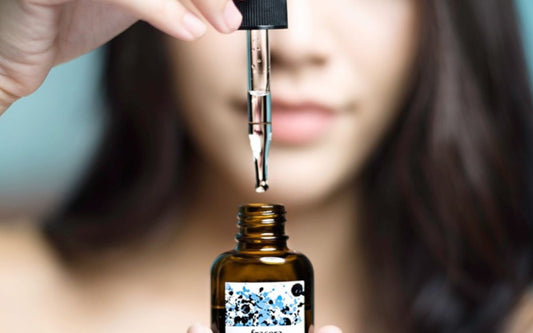Our skin tells a unique story, showing the colors of our lifestyle, environment, genetics, and more. It's a true mirror of who we are. But here's the catch—not everyone's "canvas" looks the same, even if they live similar lives. That's why it's crucial to understand the different skin types so that you can not only manage your skincare routine effectively but also prevent common skin issues for healthy skin.
In this blog, we'll dive into the essential details about various skin types, common skin problems, and how to care for your skin. Keep reading for some fascinating insights.
What Are Skin Types?
To begin, what are the skin types? In layman's terms, skin types are classifications that clarify your skin's basic features. Genes, the environment, age, and even your routine all play a role in determining your skin type. If you want your skin to look healthy and beautiful, knowing your skin type is essential for selecting the correct products and treatments.
5 Basic Skin Types You Must Know
To help you better understand your own skin type, we've compiled a list of the five most common types of skin.
1. Oily Skin
Oily skin produces extra sebum, making it look shiny and feel greasy, especially in the T-zone (forehead, nose, and chin). According to the American Academy of Dermatology (AAD), people with oily skin might have fewer wrinkles but are more likely to deal with enlarged pores, acne, blackheads, and whiteheads.
Just because your skin is oily doesn't mean it needs less moisture. It's all about picking the right products that nourish and hydrate without clogging pores or causing breakouts.
Care Tips and Product Recommendations:
- Cleanse twice daily with a foaming or gel cleanser to remove excess oil.
- Use non-comedogenic (won't clog pores) products.
- Look for oil-free moisturizers and mattifying products like anti-acne serum (salicylic acid) to control shine.
2. Dry Skin
Dry skin doesn't produce as much natural oil as other skin types, which can make it look dull and feel rough, flaky, or even scaly. It often feels tight, less elastic, and clearly dehydrated, with fine lines being more noticeable. It can also get itchy or irritated easily.
To care for dry skin, you should use gentle, soothing, and hydrating products that help keep your skin’s moisture barrier intact. Ingredients like ceramides are great for this. The Mayo Clinic suggests avoiding long, hot showers, moisturizing several times a day, and choosing skincare products that are fragrance-free, non-comedogenic, and alcohol-free
Care Tips and Product Recommendations:
- Opt for a gentle, soothing, and hydrating cleanser that won’t strip your skin of natural oils.
- Use a rich and thick moisturizer to lock in hydration.
- Ingredients like ceramides are great for this.
- Consider incorporating hydrating serums and masks into your routine.
3. Normal Skin
Normal skin is well-balanced, not too dry or oily. It doesn't get breakouts, flakiness, or feel greasy or tight. People with normal skin usually have small pores, smooth texture, and less sensitivity or blemishes. Even though it doesn't have specific issues, normal skin still needs good skincare to stay healthy and feel great.
Care Tips and Product Recommendations:
- Cleanse with a gentle, balanced cleanser.
- Use a lightweight moisturizer to keep your skin hydrated.
- Don't forget sunscreen to protect your skin from UV damage.
4. Combination Skin
Combination skin has both dry and oily areas, like an oily T-zone (forehead, nose, and chin) and possibly dry or normal cheeks. This type of skin can change with the seasons or due to factors like stress or hormones. The key to caring for combination skin is to cleanse effectively and hydrate well. I
Care Tips and Product Recommendations:
- Use a gentle cleanser that can balance both oily and dry areas.
- Apply a lightweight moisturizer on the T-zone and a richer one on the drier areas.
- Use targeted treatments, like clay masks for oily areas and hydrating masks for dry spots.
5. Sensitive Skin
Sensitive skin is often considered its own category, but you can have oily, dry, or normal skin that's also sensitive. If your skin is sensitive, it might look red and feel like it's burning, itching, or dry. This sensitivity can make your skin more prone to reacting to things like dyes, fragrances, or environmental factors.
If you have sensitive skin, figuring out what triggers your reactions can help. You might avoid products with certain ingredients that bother your skin, like certain cleansers or moisturizers. You can also adjust your surroundings to minimize contact with things that set off your skin.
Care Tips and Product Recommendations:
- Choose fragrance-free and hypoallergenic products.
- Use a gentle cleanser and a soothing moisturizer.
- Avoid harsh exfoliants and opt for gentle, calming treatments instead.
How To Determine Your Skin Type?
So, how to determined your skin type? If you want your skincare products to work, you need to know your skin type. Some possible approaches are as follows:
1. Visual Evaluation
Find out what your skin type is by taking a close look at yourself in the mirror. Your skin can be dry and sensitive if it shows red, flaky spots all over. If your face is consistently shiny, it can be an indication of oily skin. You can learn more about your skin type by looking at these visual cues.
2. Try The Day Test
Observe your skin from dawn 'til dusk to learn what it does for the whole day. Skin that is considered normal does not become abnormally dry or greasy. It may be absolutely normal for your skin to occasionally seem oily or dry.
3. Try The Wash Test
The wash test involves washing the face with a gentle cleanser and then going 30 minutes without making up or applying any other cosmetics. Pay attention to how your skin feels during this period. This test is useful for determining your skin type when it is relaxed and unaffected by environmental variables.
Seek Professional Assessment
Consider visiting a dermatologist or esthetician for a more accurate evaluation. They can analyze your skin using specialized tools and expertise to identify your exact skin type.
Importance of Correctly Identifying Your Skin Type
Knowing your skin type is crucial because it guides you in choosing the right skincare products and treatments. For example, oily skin requires different care than dry or sensitive skin. Tailoring your routine based on your skin type ensures that you address its specific needs effectively, leading to healthier, more radiant skin. Whether you do a self-assessment at home or seek professional advice, understanding your skin type empowers you to make informed decisions about your skincare routine.
Common Skin Concerns And Their Relation To Skin Types
Handling issues related to the skin? Let's examine their relationship to various skin types:
1. Pimples and Sebum Issues
Acne is a common problem for people with oily skin. Acne, blackheads, and whiteheads are all symptoms of clogged pores, which can occur on oily skin. Using treatments that regulate oil production without irritating the skin is a common strategy for acne management. You can use anti-acne serum - salicylic acid that will control the production of excess oil.
2. Skin Ducts and Dry Areas
When skin is dry, it can become tight and flaky. Because of its dryness, it requires hydrating products like rich moisturizers and creamy cleansers. One more thing you can do to eliminate dead skin cells and enhance texture is to exfoliate your skin regularly.
There are multiple products with different ingredients that you can use for your dry skin.
All these serums contain different oils—collagen, niacinamide, and vitamin E—that are good for removing fine lines and wrinkles from dry skin and making it elastic in the long run. Also, dry skin often loses its glow and shine. That's why you can search for the best serum for glowing skin in Pakistan.
3. The Skin's Sensitivity and Reactions
When exposed to certain irritants, sensitive skin may quickly become red, itchy, or even burn. Use mild, fragrance-free products that moisturize and calm your skin so it doesn't respond negatively. In order to regulate sensitivity, it is helpful to avoid harsh components and environmental conditions.
For sensitive skin, you have to test different products and see what works best for you. But sunscreen is very necessary for this skin type. That’s why you can use a sunscreen serum - zinc oxide that contains broad spectrum protection as well as hydrating and soothing ingredients.
4. Managing Combination Skin Issues
When you have combination skin, which has oily areas like the T-zone and normal or dry patches elsewhere, it can be rather challenging. Targeted skincare products, including as oil-free T-zone cleansers and moisturizing spots treatments, can help achieve a balance in these areas. The secret to achieving facial harmony is sticking to a regular schedule.
Now, we have given you options regarding your issues by telling you about the best brightening serum in Pakistan. You can better select treatments and products for your skin if you have a firm grasp on how these prevalent skin issues relate to your unique skin type. Search for the best skin care products in Pakistan and explore each brand further. You may get a healthier, more even complexion by taking care of your skin properly with the right products.
What Are Essential Steps In Skincare Routine?
Obviously, there is no "one size fits all" skincare routine for different skin types. Improving your skin's appearance and texture can be as simple as adapting your skincare routine to your unique skin type. To modify your skincare routine to meet your specific requirements, follow these steps:
Skin Cleansing
To begin, wash your face gently to remove any makeup, grime, or oil that may be present. Making sure your skin is clean before moving on to the next phase of your process is essential.
Toning
After washing your face, use a toner to restore the skin's natural pH balance and eliminate any remaining cleanser or grime. Your pores can be tightened and your skin revitalized with the use of a toner.
Possible course of action
That part depends on what's wrong with your skin. One option is to use a serum that targets particular concerns, like hyperpigmentation, acne, or aging. In comparison to everyday moisturisers, treatments are usually far stronger and more concentrated.
Deep Moisturizing
Your skin needs a moisturizer that works for its specific type in order to stay hydrated. In addition to hydrating, soothing, and protecting your skin from environmental aggressors, moisturizers help seal in moisture.
Sun Protection
It doesn't matter the season or the weather; sunscreen should always be the last step in your morning schedule. Sunscreen prevents skin cancer and premature aging by blocking the sun's ultraviolet (UV) rays.
An essential skincare routine begins with these measures. Extra items, such as masks, eye creams, or exfoliants, can be added to the routine based on your skin type and problems. If you want healthy, glowing skin, you have to be consistent.
Myths And Facts About Skin Types
There are several myths about skin types, and we don’t need you to spoil your skincare routine by believing them. That's why let’s clarify them:
Myth # 1: Oily skin doesn’t need moisturizer.Fact: Oily skin still needs moisturizer, but it should be lightweight and non-comedogenic.
Myth # 2: Dry skin should avoid exfoliation.Fact: Dry skin can benefit from gentle exfoliation to remove dead skin cells and improve texture.
Myth # 3: Normal skin doesn’t require a specific skincare routine.Fact: Normal skin benefits from a consistent skincare routine to maintain its balance and health.
Myth # 4: Sensitive skin can’t use products with active ingredients.Fact: Sensitive skin can tolerate certain active ingredients if used in appropriate concentrations and formulations.
Myth # 5: Combination skin is too complicated to manage effectively.Fact: Combination skin can be managed effectively with targeted products that address both oily and dry areas.
Instead of allowing skincare myths to control your routine, use evidence-based solutions that are specific to your skin type.
Conclusion
Having a good idea of your skin type is essential for keeping your skin healthy and looking great. With the help of the different tests, you can identify it with certainty. Never forget that your skin's condition can alter over time for a variety of reasons; therefore, it's important to reassess at regular intervals. Knowing your skin type allows you to create a personalized skincare routine that targets your skin's unique demands and makes informed selections when choosing skincare products.
Frequently Asked Questions
Can My Skin Type Change Over Time?
Yes, there are a number of factors, including aging, hormone changes, environmental influences, and lifestyle changes, that might cause a shift in your skin type. Your skin may have been greasy when you were a teenager, but now it's noticeably dryer. It's smart to take stock of your skin type every so often and make any necessary adjustments to your skincare routine.
How Can I Tell If A Product Is Right For My Skin Type?
You should try different products on different areas of your skin to see which ones work best. To determine how your skin will react to new products, start by doing a patch test on a tiny area. Keep an eye out for symptoms like redness, inflammation, or breakouts. You can ease the product into the routine if your skin reacts positively and there are no side effects.
Are Natural Products Better For Sensitive Skin?
Probably not. Although some natural products may be better suited for sensitive skin because of the gentle nature of their ingredients, this is not always the case. Even with natural products, some people may experience skin irritation or allergic reactions. Whatever you choose, be it natural or synthetic, be sure to read the label to see if it has any ingredients that could irritate your skin.
What’s The Best Way To Manage Combination Skin?
When dealing with oily and dry patches on your face, it's important to use products designed for combination skin. Care for your skin in a well-rounded way by using mild cleansers, spot treatments for regions prone to oil (like salicylic acid), and moisturisers for places that are dry. The secret to harmony and a healthy complexion is tailoring your routine to your skin's behavior in different locations and seasons.




